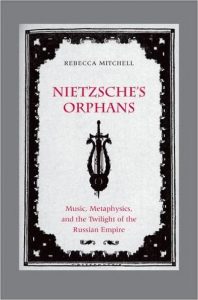
By Drew Jacobs
Published in 2016 by Professor Rebecca Mitchell, Nietzsche’s Orphans: Music, Metaphysics, and the Twilight of the Russian Empire won the W Bruce Lincoln Book Prize, given every two years for the best new book published on Russian History. An extension of Professor Mitchell’s PhD study, she spent an additional three years researching, expanding, and drafting this book. The work brought together her interests of music, history, and philosophy, all within Russia. In the novel, Mitchell examines the huge upheaval in revolutionary Russia from 1905-1917. Specifically, she studies the Russian peoples’ growing obsession with music and their conviction that the empire could be reunited through music. Her work draws on the German philosopher Friedrich Nietzsche and his theory that music could be used to unify a people.
Mitchell’s book examines three different composers who each have the potential to be the unifying Orpheus. The Russian people, and Mitchell in her book, looked for a composer to create an image of Russianness to bring the empire together at this uncertain time. The first composer whom Mitchell examines, Aleksandr Scriabin, enjoyed a great following in Russia due to both his music and philosophies. He believed his music would bring about the end of the universe through a moment of pure ecstasy. In addition to this conviction, Scriabin believed himself to be God. His Russian followers saw him as a figure calling for the reunification of Russia, and more specifically a new Russia in the modern age. Mitchell began her study interested in Scriabin and why the Russian people would be so enamored with not only his music, but also his extremist philosophies at this perilous time in Russian history. She researched two other composers, Nikolai Medtner and Sergei Rachmaninoff, who were similarly celebrated at the time.
These visions of reunification through music collapsed with a growing national emphasis on ethnic Russianness, as well as the continuing atrocities of World War I. One of the composers was ethnically German, though he grew up in Russia, and saw his following decline with Germany’s fortunes during the First World War. Scriabin died in 1915, effectively halting the momentum of his philosophy and his followers. Without these composers to unite the Russian people, the Bolsheviks rise to power and commence the Soviet Union. The book highlights the changing ideas of national belonging in Russia and the huge consequences this ideology had on the Russian empire. Mitchell combines Russian history, music, and philosophy in this award-winning work.